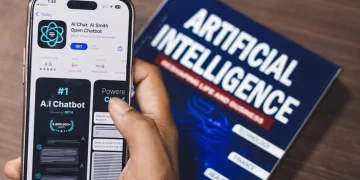The Impact of Artificial Intelligence on employment. Artificial Intelligence (AI) greatly impacts employment, transforming traditional job roles and displacing certain positions due to automation. However, AI concurrently paves the way for advanced roles, emphasising the critical need for technical skills and continuous upskilling.
This dual effect brings both challenges and opportunities in the labor market. AI’s impact extends from manual labor to professional sectors, boosting efficiency and productivity, but necessitating adaptation.
Main Points
- AI disrupts traditional business models and jobs, particularly manual labor, through automation and efficiency improvements.
- Upskilling and reskilling initiatives are necessary to equip the workforce with advanced skills, such as data analysis and machine learning, to work alongside AI.
- AI creates new roles within professional fields, including data analysts and AI trainers, signaling job evolution rather than extinction.
- Potential biases in AI algorithms can perpetuate inequalities, necessitating diverse data sets and continuous monitoring for fairness.
- While AI may lead to job displacement, it’s projected AII will lead to long-term job growth, requiring a workforce with technical skills, creativity, and adaptability.
Understanding Artificial Intelligence
Frequently misunderstood yet increasingly pivotal, artificial intelligence encapsulates the mimicry of human intelligence processes by machines, often involving sophisticated technologies such as machine learning and natural language processing. This digital intelligence embedded in machines enables them to learn, reason, and solve problems, much like a human would, albeit with an exponentially higher speed and accuracy.
AI technologies today are not only disrupting traditional business models but also redefining the job roles in various industries including healthcare, finance, transportation, and customer service. These technologies are capable of analysing vast amounts of data, discerning patterns, and making informed decisions that optimise processes and outcomes. This transformative capacity of AI to automate and enhance complex processes is what sets it apart.
Understanding the impact of Artificial Intelligence on employment is not a mere academic exercise but a necessity for anyone seeking to comprehend the future of work. The impact of AI on the job landscape is profound, influencing workforce dynamics and the overall economy. As AI continues to evolve, it is incumbent upon us to stay abreast of its capabilities, implications, and potential in order to effectively harness its power and mitigate its challenges.
Artificial Intelligence on Employment and Job Automation
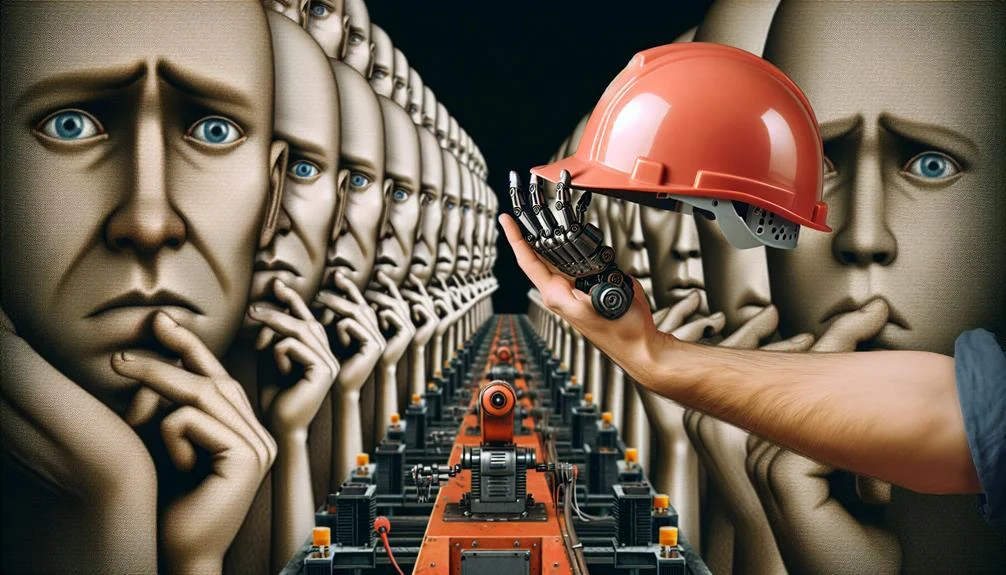
The emergence of Artificial Intelligence on employment and its increasing impact on job automation brings into focus two key aspects: its potential to replace manual labor and its role in professional fields. As AI technology evolves, it not only threatens routine and repetitive jobs but also begins to permeate more skilled areas, necessitating a new set of skills in the workforce.
This shift underpins the urgent need for strategic upskilling and reskilling initiatives, setting the stage for a transformational change in employment dynamics.
AI Replacing Manual Labor
In an evolving technological landscape, artificial intelligence and job automation have begun to profoundly transform industries reliant on manual labor, displacing traditional roles and demanding a shift towards upskilling and reskilling.
The automation of repetitive tasks, particularly in manufacturing and data entry, has led to significant job displacement. Yet this change is not solely a cause for concern. It also underscores the untapped potential of human capabilities beyond routine work.
As Artificial Intelligence on employment continues to automate manual tasks, increasing efficiency and productivity, the dynamics of the workforce are changing. The demand for manual labor is decreasing, while the need for workers with advanced skills is rising.
Therefore, the future of work in an AI-driven world necessitates an emphasis on upskilling and reskilling.
AI in Professional Fields
Moving beyond manual labor, AI’s profound influence is also reshaping professional fields, automating routine tasks and leading to significant job displacement in industries such as data entry and assembly line work. However, new roles like data analysts and AI trainers are emerging, indicating an evolution rather than extinction of jobs.
The table below presents a brief overview of the impact of AI in professional fields:
| Impact | Example |
|---|---|
| Job Displacement | Data Entry Operators |
| Automation of Repetitive Tasks | Assembly Line Workers |
| Creation of New Roles | AI Trainers |
| Increased Demand for Technical Skills | Data Analysts |
| Enhanced Decision Making | Business Analysts |
Skills Required in AI-era
As we navigate the AI-era, it becomes paramount to hone skills such as data analysis, programming, and machine learning to effectively adapt to the rapidly evolving landscape of job automation. Understanding AI algorithms and technologies is indispensable to remaining competitive. However, technical skills alone aren’t sufficient.
Soft skills like critical thinking, problem-solving, and communication are equally essential. The blend of technical expertise with interpersonal skills fosters successful integration into automated workplaces. Employers are increasingly seeking this combination in candidates.
In this AI-era, training and continuous learning have become non-negotiable. Upskilling in AI-related fields is a requisite for individuals to thrive in job roles impacted by automation.
Emerging Roles of Artificial Intelligence on Employment
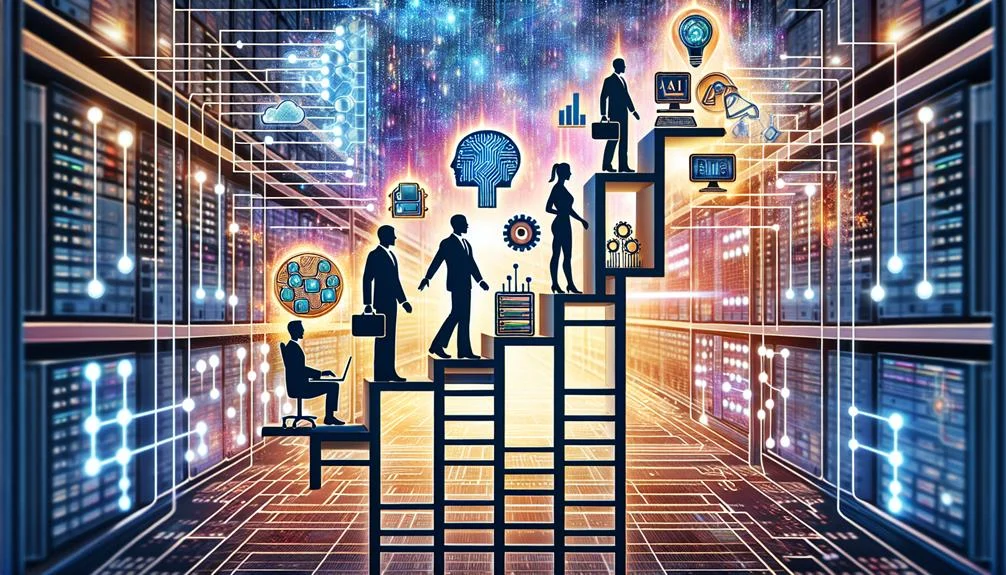
The rise of Artificial Intelligence on employment has made it essential for the emergence of novel roles such as AI ethicists, data analysts, AI trainers, AI developers, and AI researchers, each playing a pivotal part in understanding, interpreting, and advancing the capabilities of this transformative technology.
These emerging roles are crucial in understanding the complexity of the AI landscape and ensuring the effective and ethical use of AI technologies. They bring a new dimension to the labor market, calling for a different set of skills and competencies.
- AI ethicists are responsible for ensuring the ethical use of AI technologies. They play a key role in establishing guidelines for the responsible application of AI, addressing issues of privacy, bias, and transparency.
- Data analysts are critical in interpreting and making sense of the vast amounts of data processed by AI systems.
- AI trainers help to enhance the performance of AI systems, teaching them to learn and adapt through continuous learning.
- AI developers design, build, and maintain AI systems to meet specific business or industry needs, ensuring the technology aligns with the strategic goals.
- AI researchers focus on advancing the capabilities and understanding of AI technologies, paving the way for future developments in the field.
Artificial Intelligence in Existing Job Roles
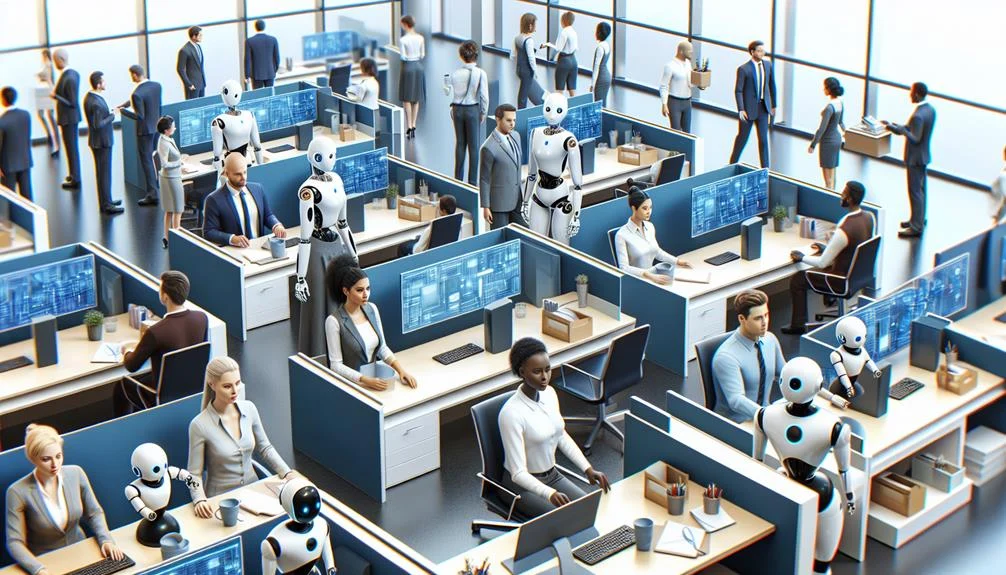
Shaping the contours of traditional professions, artificial intelligence is increasingly integrated into existing job roles, enhancing precision, accuracy, and efficiency while fostering innovation and productivity in the workforce. AI technology is transforming workplaces by automating repetitive tasks, freeing employees for more complex, creative work, and requiring adaptability to new systems and processes.
The table below summarises the integration of AI into three sectors and its impact on their existing job roles:
| Sector | Traditional Role | Enhanced Role with AI |
|---|---|---|
| Manufacturing | Assembly Line Worker | AI-assisted Quality Control |
| Healthcare | Diagnostician | AI-supported Diagnosis |
| Finance | Data Analyst | AI-enhanced Risk Analysis |
The automation of repetitive tasks through Artificial Intelligence on employment leads to significant time savings and improved outcomes. Employees’ creativity and problem-solving skills are better utilized, enhancing existing job roles in the AI infused workforce.
In the context of workforce development, Artificial Intelligence on employment is creating new opportunities, including AI Trainers and Data Analysts. These evolving job roles require a blend of technical skills and creativity, marking a shift in the workforce’s skill set. The re-skilling and up-skilling induced by the impact of Artificial Intelligence on Employment is crucial for sustaining growth and competitiveness in the age of AI.
Artificial Intelligence and Job Displacement Concerns

Despite the undeniable benefits of AI integration in various sectors, such as health, concerns over the impact of ‘Artificial Intelligence on employment’ remain a pressing issue in the modern workforce. The potential of AI technologies to automate routine and repetitive tasks fuels these concerns, leading to heightened apprehension about large-scale job displacement due to AI-driven automation.
Particularly, there are several factors contributing to these concerns:
- Automation driven by AI risks displacing jobs that involve routine and repetitive tasks.
- Industries heavily reliant on predictable work patterns, like manufacturing, face high risk.
- Job roles such as data entry and assembly line work are particularly vulnerable to AI-driven technology replacement.
- The need for proactive measures and upskilling efforts to adapt to these challenges and stay competitive.
- The urgency for workforce reskilling and strategic planning to mitigate AI’s impact on employment.
It is essential to address these concerns through proactive measures, particularly upskilling efforts. By equipping the workforce with the skills to work alongside and leverage AI, we can mitigate job displacement while reaping the benefits of AI automation. Therefore, it is important to balance the opportunities AI offers with its potential impacts on employment.
Algorithm Bias in Artificial Intelligence on Employment

Frequently overlooked, yet undeniably impactful, algorithm bias in Artificial Intelligence systems presents a significant challenge, perpetuating discriminatory outcomes due to biased data inputs or flawed programming. This can lead to reinforced societal prejudices in fields such as hiring, lending, and criminal justice. Specifically, the impact of Artificial Intelligence on employment can be profound. Algorithm bias can inadvertently favor certain demographics, creating imbalances in the employment sector, thus highlighting the need for a fair and balanced use of AI in the workforce.
| Issues Caused by Algorithm Bias | Possible Solutions |
|---|---|
| Reinforces societal prejudices | Diverse data sets |
| Unfair treatment of certain demographics | Continuous monitoring |
| Perpetuates inequalities in hiring | Algorithm audits |
| Biased outcomes in lending and justice | Ethical guidelines |
Addressing this issue requires transparency, diverse data, and continuous monitoring. Regular algorithm audits can prove beneficial in identifying and rectifying biased tendencies. Ethical guidelines, when strictly adhered to, can serve as a framework for designing and implementing AI systems devoid of bias.
AI and Wealth Gap Concerns
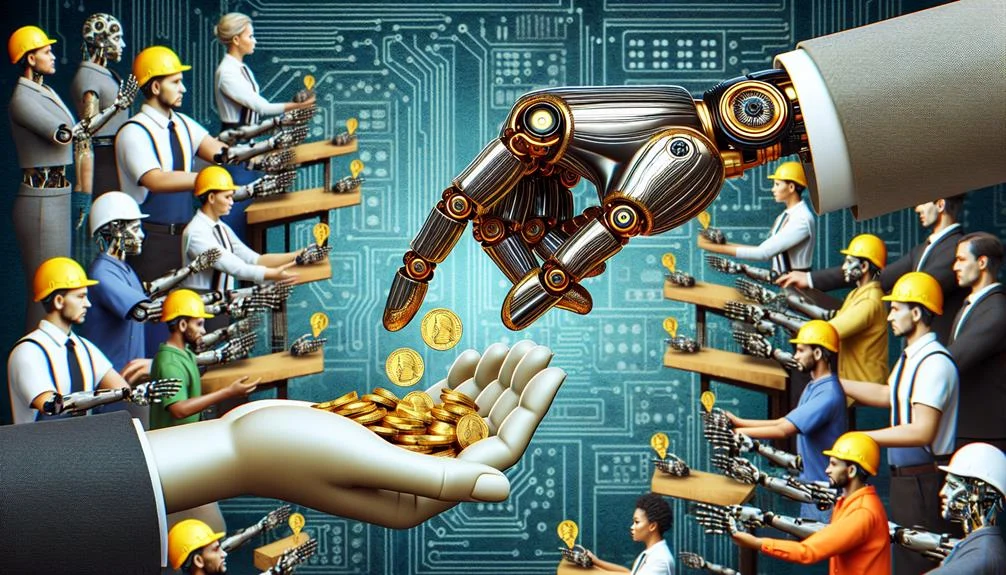
The arrival of Artificial Intelligence on employment presents a double-edged sword, providing a potential boom in job creation while simultaneously posing risks of job displacement, thereby deepening the wealth gap.
As AI intricately integrates into the fabric of employment, concerns regarding wealth disparity and unequal access to opportunities emerge.
It is important to scrutinise these concerns about AI-fueled inequality to devise strategies that guarantee a fair distribution of AI’s economic benefits and opportunities.
Artificial Intelligence on Employment: Influence and Inequality
How might the adoption of AI potentially exacerbate the wealth gap, particularly as it disproportionately benefits high-skilled workers and disadvantages those with lower skills? Indeed, the implications of AI on wealth inequality are significant and multifaceted.
- AI adoption facilitates the concentration of wealth in the hands of its owners and developers, thereby increasing wealth inequality.
- The differential impact of AI on job sectors could widen the income disparity between high-skilled and low-skilled workers.
- Job displacement, particularly among low-skilled workers, could be a major consequence of AI adoption, further deepening wealth disparities.
- High-skilled workers benefit disproportionately from AI, potentially exacerbating wealth inequality.
- Addressing these concerns through equitable AI deployment and policies is essential to secure a fair and inclusive society.
Employment Fears
As the influence of Artificial Intelligence on employment continues to evolve and automate tasks across various industries, there is a mounting fear of job displacement. This fear is particularly prevalent within sectors that rely heavily on routine work such as manufacturing and data entry.
This automation of repetitive tasks, a direct impact of Artificial Intelligence on employment, may trigger a shift towards more skilled, technical roles. This shift could potentially exacerbate wealth disparities as unskilled workers become vulnerable to unemployment. The fear is not unfounded; studies project that the impact of AI could displace millions of workers globally.
In this scenario, the relationship between Artificial Intelligence and Employment necessitates proactive measures. These include policy development and reskilling initiatives, to mitigate wealth gap concerns. Essentially, the intersection of AI and employment challenges us to guarantee fair wealth and opportunity distribution in the face of inevitable automation.
AI Driving Innovation and Growth
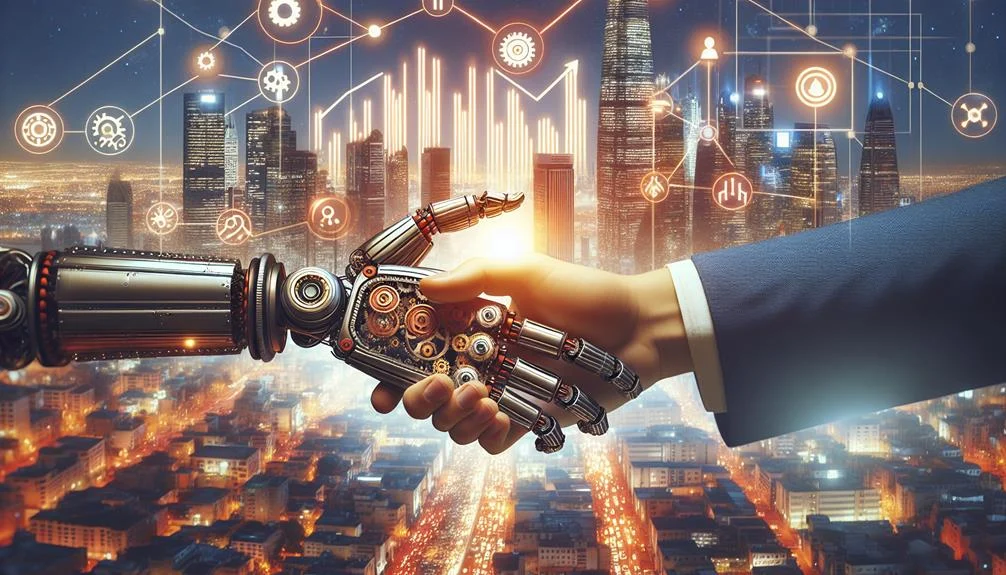
Harnessing the transformative power of artificial intelligence, numerous industries such as healthcare and finance are experiencing unprecedented innovation and growth. This AI-driven innovation is not only revolutionizing traditional practices but also generating novel job roles and opportunities.
The impact of AI is multi-dimensional and profound:
- AI’s ability to analyse vast quantities of data, often in real-time, has yielded enhanced business efficiency. This, in turn, has led to the creation of job roles such as data analysts, tasked with interpreting and leveraging these data insights.
- The emergence of AI ethicists, another new job role, reflects the growing need for guidelines and policies in AI deployment and usage.
- AI-powered technologies, like natural language processing, are opening up new job opportunities, particularly in areas like customer service and content creation.
- Personalised training programs, underpinned by AI, are enhancing job satisfaction and retention rates. These programs allow for individualised learning paths, thereby increasing employee engagement and productivity.
- Finally, AI is not merely a tool for automation but a catalyst for innovation, driving growth across a myriad of sectors.
Therefore, as AI continues to evolve, its impact on employment trends and workforce dynamics will undeniably deepen.
Balancing AI Benefits and Societal Needs
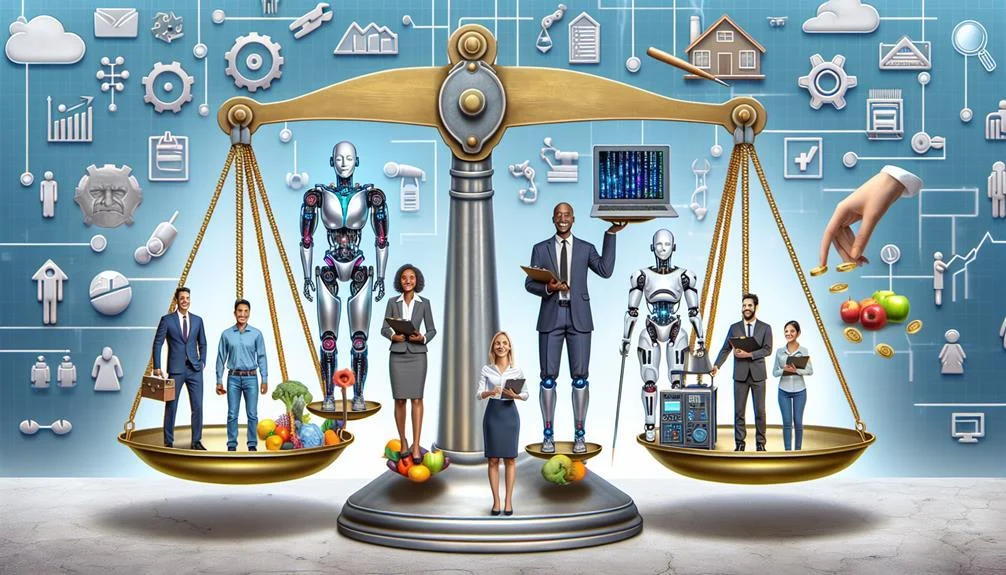
In the intersection of Artificial Intelligence on employment, a vital balance must be struck. This concept emphasizes the correlation between AI’s economic contributions and the societal needs it affects.
Concerns about job displacement due to advancements in Artificial Intelligence on employment” necessitate a keen focus on maintaining and enhancing human skills.
This intricate equilibrium guarantees the sustainable development of AI in a manner that not only drives economic growth but also respects and upholds the importance of human labor. In the context of Artificial Intelligence on employment, this balance is paramount.
Artificial Intelligence Economic Contributions
Often overlooked, the economic contributions of Artificial Intelligence serve as a significant catalyst in stimulating innovation, bolstering economic growth, and improving efficiency across various industries. The impact of AI on the economy is multifaceted and complex, but its potential for positive change is undeniable.
- AI’s potential to create new job opportunities, even as it disrupts traditional employment sectors.
- The role of AI in driving economic growth through increased productivity and efficiency.
- The varying impact of AI on unemployment rates across different regions and industries.
- The importance of balancing AI benefits with societal goals for shared prosperity.
- The need for harmonious alignment between AI’s economic contributions and societal needs to secure overall success.
Thus, AI’s potential economic contributions can shape a prosperous and equitable future when managed effectively.
Job Displacement Concerns
While AI’s potential economic contributions hold significant promise, the fear of job displacement due to automation, particularly in industries reliant on routine tasks, poses a challenging challenge that requires careful consideration and strategic planning.
| Job Displacement Concerns | AI Integration |
|---|---|
| Widening wealth gap | 20-50 million new jobs by 2030 |
| Industries reliant on routine tasks at risk | Unemployment rate concerns persist |
| Ethical implications | Addressing disruptions in employment |
The ethical implications of AI integration, including job security and the widening wealth gap based on skills and knowledge, necessitate a balance between AI benefits and societal needs. Strategic planning must be employed to mitigate the challenges and exploit the opportunities presented by AI in the job market.
Emphasising Human Skills
The advent of artificial intelligence on employment compels us to place a renewed emphasis on indispensable human skills such as creativity, emotional intelligence, and complex problem-solving, as they play a vital role in achieving a balanced integration of AI in society. These skills, which cannot be replicated by AI, are vital to fostering a harmonious coexistence between humans and machines.
- Human skills are essential for roles that require empathy, innovation, and critical thinking.
- Integrating human skills with AI technologies can lead to more effective problem-solving.
- Prioritising human skills development alongside AI implementation can create a more sustainable workforce.
- The synergy between human skills and AI capabilities can drive innovation and productivity.
- Emphasising the development of creativity and emotional intelligence can foster job satisfaction in an AI-driven world.
Future of Artificial Intelligence on Employment
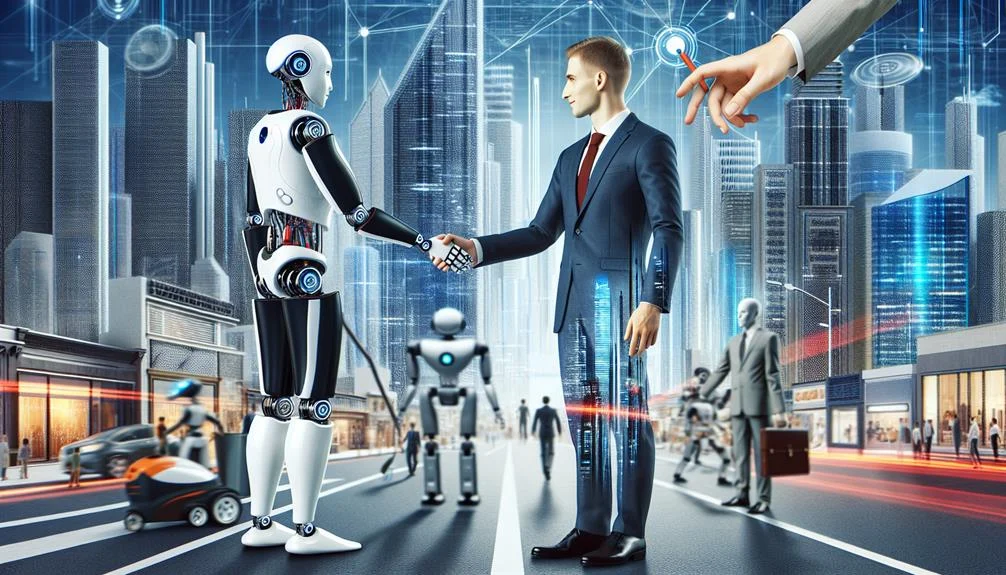
Projected to create between 20 to 50 million new jobs by 2030, artificial intelligence is poised to reshape the future of employment, demanding a workforce with a fresh set of technical skills, creativity, and adaptability. The integration of AI technologies in various industries is paving the way for the future of work by creating new job roles. These range from AI trainers who educate systems to understand human nuances, to data analysts who interpret complex digital information.
Artificial Intelligence on employment has become a significant topic of discussion in today’s technologically driven world. Automation, a crucial facet of AI, has amplified productivity by enhancing precision and accuracy in existing jobs, thereby minimizing human error. As a result, Artificial Intelligence’s impact on employment has led to the transformation of traditional roles and the introduction of new ones. For instance, the role of a data analyst has now expanded to include AI programming, necessitating a different set of skills.
The surge in AI adoption underscores the need for a focus on training and education. This is to equip the future workforce with the requisite competencies in the context of Artificial Intelligence on employment. Therefore, it becomes essential to integrate AI-related modules in educational curriculums to ensure a seamless transition in the future job market
A list of new jobs create by artificial intelligence
- AI Specialist: Responsible for implementing and maintaining AI systems in a business.
- Data Scientist: Uses statistical tools and AI programs to analyse and interpret complex data.
- Machine Learning Engineer: Develops and applies machine learning algorithms to increase automated data interpretation.
- Robotics Engineer: Designs and develops machines to perform tasks that would usually require human intelligence.
- AI Ethics Officer: Ensures AI technologies are used ethically and responsibly.
- AI Application Developer: Uses programming and AI to develop applications that implement AI technologies.
- Chatbot Developer: Creates and maintains AI-powered chatbots for customer service or other business needs.
- AI Product Manager: Oversees the development and implementation of AI products within a company.
- AI Trainer: Works with AI systems to teach them tasks, improve their learning and correct mistakes.
- Algorithm Engineer: Specialises in designing, developing, and implementing new algorithms for AI applications.
- AI Research Scientist: Conducts research to advance the field of AI, and applies research findings to practical problems.
- Automation Analyst: Identifies tasks and processes that can be automated using AI, and implements automation solutions.
- AI Solutions Architect: Designs, builds, and maintains AI infrastructure within a company.
- AI Data Analyst: Uses AI to interpret and analyse data, make predictions, and provide insights.
- AI Systems Analyst: Evaluates, tests, and manages AI systems and applications.
- AI Technologist: Keeps up with the latest AI technology advancements and implements them in the company’s operations.
Conclusion
To sum up, while Artificial Intelligence indeed presents concerns about job displacement and wealth gap, it also offers significant potential for innovation, growth, and the emergence of new roles in the employment sector.
It’s imperative to balance these aspects of Artificial Intelligence on employment through robust societal and policy measures. The future of AI and its impact on employment is not a zero-sum game; rather, it offers an opportunity to redefine work, augment human capabilities, and drive economic growth. This highlights the crucial role of Artificial Intelligence on employment as it continually shapes our workforce landscape.



